- Home
- Robert Hugh Benson
The Dawn of All Page 46
The Dawn of All Read online
Page 46
(II)
It was not until a few days before Christmas that theCardinal was sent for.
At the beginning of the month the Commission had been appointedby an overwhelming majority in the House. The proposal had beenbrought forward suddenly by the Government, and with a speed andan employment of business-like methods that seemed very strangeto the man who had lost his memory, and who still had hangingabout him a curious atmosphere of earlier days, the Commissionhad despatched an immense amount of work within three weeks.
It was impossible to know how far negotiations had got; but eventhe Cardinal himself was taken by surprise when he received aninvitation to attend the sitting of the Commission. He sent forMonsignor Masterman at once.
"You will attend me, Monsignor, please. I shall have to appearalone, but I should like you to be at hand."
It was with very much confused emotions that Monsignor foundhimself, a day or two later, walking up and down a corridor inthe House of Representatives. He had arrived with the Cardinal,had gone up the broad staircase behind him, and had followed himeven into the committee-room. A long table faced him as heentered, and he noticed with an odd little thrill how every mansitting there, from the white-faced, white-haired man at thehead, down to the clean-shaven, clever-looking young man nearestthe door, had risen as the two ecclesiastics came in. The table,he noticed, was strewed with papers. An empty chair stood at thelower end of the table--a red chair, he saw, with gilded wood.
The Cardinal sat down. The rest sat down, all in silence.Monsignor placed the despatch-box in front of his chief, openedit, laid a few books in order, and went out. . . .
Even now, in spite of all the knowledge that he had, and theconstant contemplation of the cold facts of the case, it seemedto him, as on a dozen occasions before since his lapse of memory,as if life were not so real as it seemed. Somewhere, down in thevery fibre of him, was an assumption that England and Catholicismwere irreconcilable things--that the domination of the one meantthe suppression of the other. Certainly history was against him.For more than a thousand years Church and State in England hadbeen partners. It was but for four hundred years--and those yearsof confusion and of the gradual elimination of thesupernatural--that the two had been at cross-purposes. Was it nothistorically certain therefore that, should the Supernatural everbe reaccepted in all its force, a partnership should again springup between a State that needed a Divine authority behind its own,and the sole Institution which was not afraid to stand out forthe Supernatural with all its consequences? Theology was againsthim; for if there was anything that theology taught explicitly,it was that the soul was naturally Christian, and thereforeimperfect without the full Christian Revelation.
And yet, as he walked, he was disturbed. The proposedEstablishment of the Church by the State appeared to himuncharacteristic of both--of the Church, since he still tended tothink that she must in her essence be at war with the world; ofthe State, since he still tended to think that that too, in itsessence, must be at war with religion. In spite of what he hadseen, he had not yet grasped with his imagination that which bothexperience and intellect justified as true--namely, that it isthe function of the Church to guide the world, and the highestwisdom of the world to organize itself on a supernatural basis.
He walked up and down, saying nothing. At one end of the longcorridor a couple of secretaries whispered together on a settee;at the other he saw passing and repassing hurrying figures thatwent about their business. Doors opened occasionally, and a mancame out; once or twice he saluted an acquaintance. But all thewhile his attention remained fixed upon the door numbered XI,behind which this quietly significant affair proceeded. The wholeplace seemed a very temple of stillness. The thick carpetunderfoot, the noiseless doors, the admirable system of theplace--all contributed to create a great solemnity.
He tried to remind himself that he was present at the making ofhistory, but it was useless. Again and again, as, with an effort,he forced the principles before his mind, his attention whirledoff to a detail--to a contemplation of his chief taking his seatin the House of Lords, and to the fabric of the carpet on whichhe walked; to the silent whisper of one of the two conversationalsecretaries; to a wonder as to the form of prayer with which thefirst professedly Catholic Parliament in England for more thanfour hundred years would open.
Then he checked himself, reminded himself of certain oldproverbs about cups and hares, reflected that Socialism was notbeaten yet (in Father Jervis's phrase), as recent events inGermany had shown. . . .
Once as he turned at the end of the corridor farthest from thesecretaries, an interesting little incident happened. A dooropened abruptly, and a man coming out quickly almost ran againsthim. Then the man took off his hat and smiled.
"I beg your pardon, Monsignor . . . I . . . I can guess yourbusiness here."
Monsignor smiled too, a little guiltily. He recognized theSocialist leader who had called on him a few months before.
"Yes: and I'm afraid you don't approve," he said.
Mr. Hardy made a little deprecatory gesture, still holding hishat in his hand.
"Oh! I'm a believer in majorities," he said. "And there's nodoubt you have the majority. But----"
"Yes?"
"I hope you will be merciful. That is your Gospel, you know."
"You think we have the majority?"
"Oh, certainly. The enfranchisement of women settled all that.They are always clerical, you know."
Monsignor felt the point prick him. He riposted gently.
"Well, you will have to take refuge in Germany," he said.
The face of the other changed a little; his eyelids came downjust a fraction.
"That's exactly what I'm going to do, Monsignor--I--but I thinkthere's somebody wanting you."
Monsignor turned. There was a hand beckoning him from behind aface, as if in agitation, from the entrance to door No. XI.
"If you'll excuse me," he said, and hurried off.
"I thought you'd like to be present at the end, Monsignor,"whispered the member who had beckoned him. "The Cardinal isjust speaking."
Committee room number XI seemed strangely quiet, as the prelateslipped in behind his friend and stood motionless. One voice wasspeaking; and, as he tried to catch the sense, he looked roundthe faces, that were all turned in his direction. He saw Mr.Manners on the extreme left.
Every man sat without moving, simply listening, it seemed, with anextraordinary attention; some leaning forward, some back, with thepapers disregarded on the table. A couple of recording machinesstood now in the centre. Then he began to catch the words. . . .
"I think, gentlemen," said the voice from behind the high-backedchair, "that I need say no more. We have discussed at length, andI hope to your satisfaction, the particular points on which youdesired information: and my answers have brought out, I think, theessence of all the conditions on which alone the Church canaccept the terms proposed.
"I wish it to be brought before the House, perfectly clearly,that in her own province the Church must be supreme. She musthave an entire and undisputed right over her own doctrine anddiscipline; for that is at the root of her only claim to beheard. In respect to any legislation which, in her opinion,touches the eternal principles of morality--in all such things,for example, as the marriage law--her supreme authority must berespected; as well as in all those other matters of the samenature upon which you have questioned me.
"But on the other side the Church recognizes, and always willrecognize, the right of a free people to govern themselves; and,not only recognizes that right, but will support it with all thepower at her command. I have acknowledged that in a few instancesin history ecclesiastics have interfered unduly with what did notconcern them--interfered, that is, not as citizens (for that istheir right, in common with all other citizens)--but in the Nameof Religion. Now that, gentlemen, is simply a thing of the past.If secular rulers have learned by experience, so haveecclesiastical rulers. . . . I have invited investigation intothe history of the last hu
ndred years; and I have answered thosefew charges that have been brought--I hope to your satisfaction."(There was a murmur of applause.)
"In secular matters, therefore, the Church will be wholly on theside of liberty. Ecclesiastical authorities, for example, wouldbe the first to welcome a repeal of legislation as regardsheresy; but, on the other hand, we fully recognize the right of asecular State to protect itself, even by the death penalty,against those who threaten the existence of the sanctions onwhich a secular State takes its stand. We recognize her right, Isay; but I do not mean by that that you will not find a majorityof ecclesiastics who hold that it is, to put it mildly, adeplorable policy and very imperfectly Christian.
"However, I have said all this before, both in public and nowagain in answer to your questions; and I think that, at any rateso far as I am concerned, I shall not be to blame if the nationaccepts the proposed change under a misapprehension.
"You see, gentlemen, the attempt that ended fifty years ago--theattempt that was called in its day Protestantism--to establish areligion which was to be secondary in any sense to the State,failed and failed lamentably, in spite of the noble lives thatwere spent in labouring for such a compromise. For it is thewhole essence of a Supernatural Religion to be supreme in it ownprovince--the very adjective asserts it; and any endeavour tocompromise on this entirely vital point is in itself a denial ofthe principle, For a while this was not perceived. Men regardedthe Christian Church--or rather, that which they took to be theChristian Church--merely, on its earthly side, as an organizationcomparable to a State. They did not seem to see that Religionmust always have a wider basis than any secular body, since itdeals with eternity as well as with time, while the State,professedly, treats only of temporal things. The consequence waseither conflict, whenever supernatural elements clashed withnatural; or else the subservience of Religion, and its consequentloss of prestige, as well as of its supernatural character. ANational Church, therefore, is a contradiction in terms, since itasserts that that which is in its very nature larger than thisworld must yet be confined within the limits not only of thisworld, but even of a part of it. . . . Well, I need not labourthat point. You grasped it, gentlemen, even before you were goodenough to ask me to give evidence before this Commission. I feltit, however, only right that such conditions should be reiteratedand recorded before matters went any farther.
"The Church, therefore, is perfectly content to remain as she hasalways remained in this country for the last four centuries--afree society governing the consciences of her children. Or she iscontent to take outwardly and officially that position which shehas always, at least tacitly, claimed, and to reassume her civildignity and her civil responsibilities. But she is not content towaive any of those Divine Rights with which her Founder endowedher, even in return for the greatest privileges; still less isshe content to receive those privileges under falsepretences. . . ."
Again the low murmur of applause broke out, and three or four menshifted their positions slightly.
* * * * *
Monsignor was conscious again, suddenly and vividly, of thatdouble sense of unreality and of intense drama which he had feltso often before at critical moments. It seemed to him amazing,and yet more amazingly simple, that such claims should be put insuch words under such circumstances. It was astounding that suchthings should be said, and yet more astounding that they neededto be said, for were they not, after all, the very elements ofcivil and religious relations? . . .
There was something too in the voice of the invisible speakerthat thrilled his very heart. The tones were completely tranquil,there were no gestures, and the very face that spoke was unseen.Yet in the quiet fluency, the note of absolute assurance, therewas a dominating appeal that was almost hypnotic in its effect.He had perceived this characteristic of the Cardinal oftenbefore; he had noticed it first on that occasion on which, forthe first time in his knowledge, he had come into his presence,still staggered by the shock of his mental failure and recovery.But he had never appreciated the strength of the personality soclearly. The Cardinal was no orator in the ordinary sense; therewas no thunder or pathos or drama in his manner. But his completeassurance and the long, gentle, incisive sentences, moving likerollers in a calm sea, were more affecting than any passion couldbe. . . . It seemed to him now the very incarnation of thatspirit of the Church that at once attracted and repelled him--inits serenity, its gentleness, its reasonableness, and itsirresistible force.
* * * * *
Then, on a slightly higher note, and with a perceptible increaseof deliberation, the voice went on.
"I must add one word, gentlemen.
"I said just now that the Church was content to be as she hasrecently been in this country--content, that is, so long as shecontinues to enjoy the liberty with which England endows her.
"And perhaps, as her chief minister in this country, I ought tosay no more. But, gentlemen, I am an Englishman as well as aCatholic, and I love England only less than I love the Church. Isay frankly that I do love her less. No man who has anyprinciples that can be called religious can say otherwise. I tellyou plainly that should it come to be a choice between Caesar andGod--between the King and the Pope--I should throw myself at onceon the side of Christ and his Vicar. . . ."
(Monsignor drew a breath. It seemed to him that this wasappallingly plain speaking. He expected a murmur of remonstrance.He glanced at the faces, but there was no movement or change,except that a young member suddenly smiled, as with pleasure.)
"But I love England," went on the voice, "passionately anddevotedly. And in spite of what I said just now I must add that,as an Englishman, there is but one more thing that I desire formy country, and that is that she may carry out that project onwhose account you, gentlemen, have met to-day."
(Again a murmur of applause rose, and sank again instantly.)
"You have kindly asked me to make this little speech, and I donot wish to turn it into a sermon, but I must conclude by sayingthat, splendid as is the history of England in many points, thereis one black blot upon the page, and that, the act of hers bywhich she renounced Christ's Vicar, by whom kings reign. You havedone justice at last in returning to us those possessions whichour forefathers dedicated to God's service. But there remains onemore thing to do, formally and deliberately, as one kingdom, toreturn to Him who is King of kings. I know it will come some day.As individuals, Englishmen have already returned to Him. But acorporate crime must be expiated by corporate reparation, and itis that reparation which has already waited too long. I am an oldman, gentlemen. That, no doubt, is why I have been so verbose,but my one prayer for the last thirty years has been that thatcorporate reparation may be made within my own lifetime. . . ."
The voice suddenly trembled.
Then the watcher saw the chair pushed back, and the littlescarlet cap, covering the white hair, rise above it.Simultaneously every man rose to his feet.
"That is all, gentlemen."
There was a moment's silence.
Then the applause broke out. It was not loud or noisy, as therewere scarcely two dozen men in the room, yet it wasastonishingly affecting, just the tapping of hands on the tableand a murmur of voices.
The Cardinal silenced it by a gesture.
"One word, gentlemen. . . . I have said nothing of anyopposition. Perhaps it would have been better if I had. But Iwill only say this, and it is something of a warning too. I donot believe that this Bill that is spoken of will necessarilymean peace. I am aware of the dangers that are threatening;perhaps I am even more aware of them than any other personpresent. And yet, for all that, I am not in favour of delay."
He turned suddenly, and with his long smooth step was at the dooralmost before Monsignor had time to open it and step aside. Therewas no time for any other man to speak.
The car had hardly moved off from the door before Monsignorturned to his chief.
* * * * *
"Your Eminence," he said, "what was that about danger? I didnot understand."<
br />
The thin face was a little pale with the exertions of the speech,as it turned to him in answer.
"I will tell you that," he said, "as soon as the Bill becomes law."
CHAPTER VI

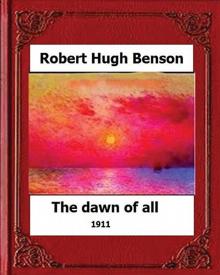 The Dawn of All
The Dawn of All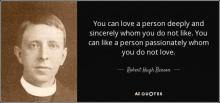 By What Authority?
By What Authority?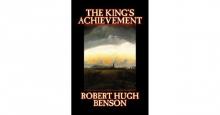 The King's Achievement
The King's Achievement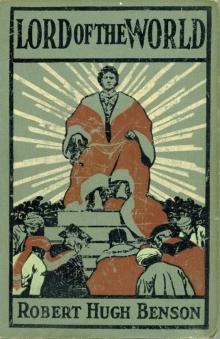 Lord of the World
Lord of the World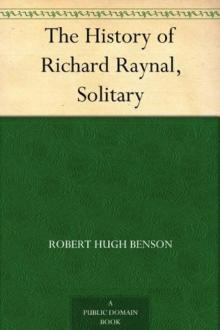 The History of Richard Raynal, Solitary
The History of Richard Raynal, Solitary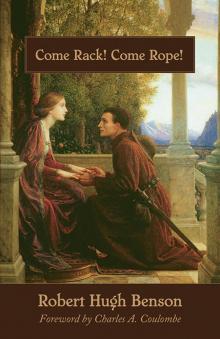 Come Rack, Come Rope
Come Rack, Come Rope